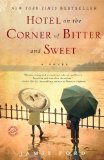Summary | Excerpt | Reading Guide | Reviews | Beyond the Book | Readalikes | Genres & Themes | Author Bio

A Novel
by Jamie Ford
Occasionally, though, he’d wonder about statistics. Not the cancer mortality rates that had caught up with dear Ethel. Instead he thought about himself, and his time measured on some life insurance actuarial table. He was only fifty-six—a young man by his own standards. But he’d read in Newsweek about the inevitable decline in the health of a surviving spouse his age. Maybe the clock was ticking? He wasn’t sure, because as soon as Ethel passed, time began to crawl, clock or no clock.
He’d agreed to an early retirement deal at Boeing Field and now had all the time in the world, and no one to share the hours with. No one with whom to walk down to the Mon Hei bakery for yuet beng, carrot mooncakes, on cool autumn evenings.
Instead here he was, alone in a crowd of strangers. A man between lifetimes, standing at the foot of the Panama Hotel once again. Following the cracked steps of white marble that made the hotel look more like an Art Deco halfway house. The establishment, like Henry, seemed caught between worlds. Still, Henry felt nervous and excited, just like he had been as a boy, whenever he walked by. He’d heard a rumor in the marketplace and wandered over from the video store on South Jackson. At first he thought there was some kind of accident because of the growing size of the crowd. But he didn’t hear or see anything, no sirens wailing, no flashing lights. Just people drifting toward the hotel, like the tide going out, pulling at their feet, propelling them forward, one step at a time.
As Henry walked over, he saw a news crew arrive and followed them inside. The crowd parted as camera-shy onlookers politely stepped away, clearing a path. Henry followed right behind, shuffling his feet so as not to step on anyone, or in turn be stepped upon, feeling the crowd press back in behind him. At the top of the steps, just inside the lobby, the hotel’s new owner announced, “We’ve found something in the basement.”
Found what? A body perhaps? Or a drug lab of some kind? No, there’d be police officers taping off the area if the hotel were a crime scene.
Before the new owner, the hotel had been boarded up since 1950, and in those years, Chinatown had become a ghetto gateway for tongs—gangs from Hong Kong and Macau. The city blocks south of King Street had a charming trashiness by day; the litter and slug trails on the sidewalk were generally overlooked as tourists peered up at egg-and-dart architecture from another era. Children on field trips, wrapped in colorful coats and hats, held hands as they followed their noses to the mouthwatering sight of barbecue duck in the windows, hanging red crayons melting in the sun. But at night, drug dealers and bony, middle-aged hookers working for dime bags haunted the streets and alleys. The thought of this icon of his childhood becoming a makeshift crack house made him ache with a melancholy he hadn’t felt since he held Ethel’s hand and watched her exhale, long and slow, for the last time.
Precious things just seemed to go away, never to be had again.
As he took off his hat and began fanning himself with the threadbare brim, the crowd pushed forward, pressing in from the rear. Flashbulbs went off. Standing on his tippy toes, he peered over the shoulder of the tall news reporter in front of him.
The new hotel owner, a slender Caucasian woman, slightly younger than Henry, walked up the steps holding . . . an umbrella? She popped it open, and Henry’s heart beat a little faster as he saw it for what it was. A Japanese parasol, made from bamboo, bright red and white—with orange koi painted on it, carp that looked like giant goldfish. It shed a film of dust that floated, suspended momentarily in the air as the hotel owner twirled the fragile-looking artifact for the cameras. Two more men brought up a steamer trunk bearing the stickers of foreign ports: Admiral Oriental Lines out of Seattle and Yokohama, Tokyo. On the side of the trunk was the name Shimizu, hand-painted in large white letters. It was opened for the curious crowd. Inside were clothing, photo albums, and an old electric rice cooker. The new hotel owner explained that in the basement she had discovered the belongings of thirty-seven Japanese families who she presumed had been persecuted and taken away. Their belongings had been hidden and never recovered—a time capsule from the war years.
Excerpted from Hotel on the Corner of Bitter and Sweet by Jamie Ford Copyright © 2009 by Jamie Ford. Excerpted by permission of Ballantine Books, a division of Random House, Inc. All rights reserved. No part of this excerpt may be reproduced or reprinted without permission in writing from the publisher.
Your guide toexceptional books
BookBrowse seeks out and recommends the best in contemporary fiction and nonfiction—books that not only engage and entertain but also deepen our understanding of ourselves and the world around us.